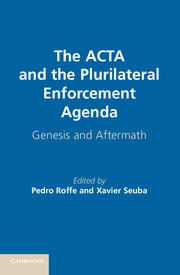Book contents
- Frontmatter
- Contents
- List of Contributors
- Foreword
- Acknowledgments
- Acronyms
- Introduction
- PART I THE FINAL ACT: ITS MAIN FEATURES AND CONTENTS
- PART II DOMESTIC LEGISLATIVE CHALLENGES
- 9 ACTA’s Constitutional Problem in the United States
- 10 Trick or Treaty?
- 11 A Brazilian Perspective
- 12 Lessons to Be Drawn from the ACTA Process
- PART III IMPACT ON RELATED PROCESSES
- PART IV VIEWS FROM STAKEHOLDERS: LESSONS
- PART V WHAT LIES AHEAD ACTA
- Annex I Anti-Counterfeiting Trade Agreement
- References
- Index
- References
11 - A Brazilian Perspective
Res Inter Alios Acta
Published online by Cambridge University Press: 05 December 2014
- Frontmatter
- Contents
- List of Contributors
- Foreword
- Acknowledgments
- Acronyms
- Introduction
- PART I THE FINAL ACT: ITS MAIN FEATURES AND CONTENTS
- PART II DOMESTIC LEGISLATIVE CHALLENGES
- 9 ACTA’s Constitutional Problem in the United States
- 10 Trick or Treaty?
- 11 A Brazilian Perspective
- 12 Lessons to Be Drawn from the ACTA Process
- PART III IMPACT ON RELATED PROCESSES
- PART IV VIEWS FROM STAKEHOLDERS: LESSONS
- PART V WHAT LIES AHEAD ACTA
- Annex I Anti-Counterfeiting Trade Agreement
- References
- Index
- References
Summary
Introduction
According to the Latin maxim “res inter alios acta … aliis nec nocet nec prodest,” whatever is agreed among certain parties neither benefits nor harms non-parties to the treaty. Nothing could be less apropos to qualify the Anti-Counterfeiting Trade Agreement (ACTA), initially discussed among just a few parties. When the final text emerged in late 2012, it became obvious that the nations excluded from the negotiating process might well end up being harmed by the agreement, or at least not benefiting from it in any significant way.
In October 2007, the United States, Japan, Switzerland and the European Union announced that they would launch negotiations for an Anti-Counterfeiting Trade Agreement (ACTA) with the aim of “providing a response to the increase in global trade of counterfeit goods and pirated copyright protected works.” A very peculiar characteristic of the initial phases of the proceedings was the secrecy surrounding the negotiating text. This was probably the aspect that generated the most dissatisfaction among civil society, particularly in the United States, Australia, Canada and EU countries. The fact that influential business associations such as the International Trademark Association, the Pharmaceutical Research and Manufacturers of America and International Intellectual Property Alliance had access to the text under negotiation, while other NGOs and third-party countries were held away, contributed to a sense of impending impropriety.
- Type
- Chapter
- Information
- The ACTA and the Plurilateral Enforcement AgendaGenesis and Aftermath, pp. 202 - 210Publisher: Cambridge University PressPrint publication year: 2014



